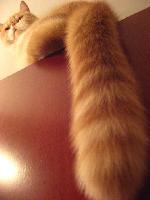Category: "Uncategorized"
Хвост
 I’ll have to admit that I can’t take credit for today’s word of the day: my kitty helped me come up with it. She woke me up this morning by tickling my nose with her tail as she lay comfortably on my pillow. Still sleepy, I tried to move the little bugger without having to get up and inevitably being forced to start my day. After a few unsuccessful attempts to redirect that fuzzy fur piece, I gave up. (It was time to get up anyway
I’ll have to admit that I can’t take credit for today’s word of the day: my kitty helped me come up with it. She woke me up this morning by tickling my nose with her tail as she lay comfortably on my pillow. Still sleepy, I tried to move the little bugger without having to get up and inevitably being forced to start my day. After a few unsuccessful attempts to redirect that fuzzy fur piece, I gave up. (It was time to get up anyway ![]() ).) Meanwhile, I thought that the word “tail” was worth writing about.
).) Meanwhile, I thought that the word “tail” was worth writing about.
In Russian tail is «хвост». It is a noun of masculine gender. The plural form is «хвосты» and diminutive is «хвостик».
| Sg | Pl | |
| Nom | хвост | хвосты |
| Acc | ||
| Gen | хвоста | хвостов |
| Pre | хвосте | хвостах |
| Dat | хвосту | хвостам |
| Ins | хвостом | хвостами |
In Russian this word has a few meanings, just like in English. The main one is an animal's body part.
| Я где-то читал, что когда кошка падает с высоты, ей хвост помогает найти равновесие, чтобы приземлиться на все четыре лапы. | "I read somewhere that when a cat falls from a height; her tail helps her find balance in order to land on all four paws." |
Another meaning is ‘ponytail’ (the hairstyle). For example:
| Ну что ты волосы опять в хвост собрала? Распусти - они у тебя такие красивые! | "Why did you make a ponytail again? Let your hair down – it is so beautiful!" |
| Моей дочке очень нравится, когда я ей волосы в хвостик собираю. | "My daughter likes when I gather her hair in a little ponytail." |
Also, it could mean a tail of something very long, such as a ship or an airplane.
| — Ты видел хвост самолёта Гавайских авиалиний? — Да, видел, на нём девушка нарисована с цветком в волосах. |
“Did you see the Hawaiian Airlines aircraft tail?” “Yes, I did, there is a girl with a flower in her hair on it.” |
Just like in English, this word can mean to chase or to follow someone.
| — Полиция у нас на хвосте! Что делать будем? — Поворачивай направо на следующем перекрёстке! |
“The police are on our tail! What are we going to do?” “Turn right at the next intersection!” |
Also, the word «хвост» has a very interesting meaning in student life. It describes an assignment that a student has not turned in in time, and because of which his grade is pending.
| Если не хотите, чтобы вас отчислили, сдайте все хвосты до первого числа! | "If you don’t want to be expelled, turn in all the late assignments before the first of the month!" |
The latter sounds funny and provokes lots of jokes about students literally turning in their tails... ![]()
Here is an episode from the Russian version of Winnie the Pooh, where the donkey loses his tail!
Стоить (часть первая)
The verb “to cost” in Russian is стоить:
| Imperfective | |
| Infinitive | стоить |
| Past | стоил стоила стоило стоили |
| Present | стою стоишь стоит стоим стоите стоят |
| Future |
буду стоить будешь стоить будет стоить будем стоить будете стоить будут стоить |
| Imperative | not generally used |
The verb is mostly used in the third person. Bear in mind that the thing whose price you are discussing is the subject of the verb, so the verb has to agree with it:
| Сколько стоит эта машина? | How much does this car cost? |
| Сколько стоят эти джинсы? | How much do these jeans cost? |
| Сколько стоил твой галстук? | How much did your tie cost? |
| Сколько стоила твоя машина? | How much did your car cost? |
The price itself goes into the accusative case. You don't normally notice that it's accusative because the accusative of most numbers is the same as the nominative; but if the cost includes a feminine singular noun like копейка, then you will clearly see the accusative. Likewise the number тысяча ‘one thousand’ is a noun in form, so you may see its accusative form as well.
| Одна конфета раньше стоила одну копейку. | One piece of candy used to cost one copeck. |
| Эти очки стоили тысячу долларов. | These glasses cost a thousand dollars. |
One thing a beginner has to be careful about is the stress on these verb forms since they are different from the forms of стоять, even though they are mostly spelled the same. You can take a look here for a quick review of that verb.
Лист (часть вторая)
One of the greatest Russian writers, Ivan Sergeyevich Turgenev, once said that Russian language is «великий и могучий», “great and mighty”. I believe that one of the reasons it is true is that some words in Russian encompass a few completely different meanings.
Previously I talked about the word «лист», meaning “leaf”, but «лист» can also mean a piece of paper or two pages in a book.

| Запишите всю нужную информацию на листе бумаги. | "Write down all the necessary information on a piece of paper." |
| — Ты уже прочёл Преступление и наказание? — Нет, мне ещё двадцать листов осталось. |
“Did you read Crime and Punishment yet?” “No, I still have forty pages left.” |
| У тебя нет листа бумаги? Я забыла свою тетрадь. | Do you have a piece of paper? I forgot my notebook. |
| — Что ты сделала с тем листом бумаги, который я тебе дал минуту назад? — Я сделала самолётик и пустила его в Сашу. |
“What did you do to that piece of paper I gave you a minute ago?” “I made a paper airplane and threw it at Sasha.” |
The diminutive for лист is «листик» or «листок». Both of them can be used interchangeably.
| Дай мне, пожалуйста, этот листок бумаги, я перепишу как туда добраться. | "Give me, please, that little piece of paper; I will copy the directions how to get there." |
| — Ты не видел здесь листик сиреневый был? У меня на нём расписание записано было. — Вон он, там, на столе. |
“Did you see a little purple piece of paper here? I had my class schedule written on it.” “There it is, on the table.” |
The plural form of the word «лист» in its current meaning is «листы».
| Sg | Pl | |
| Nom | лист | листы |
| Acc | ||
| Gen | листа | листов |
| Pre | листе | листах |
| Dat | листу | листам |
| Ins | листом | листами |
The verb «листать», "to turn" or to "flip through" pages is also formed from the root «лист» as well as the word «листовка», which means “flyer”.
| Я быстро пролистала эту книгу и она показалась мне давольно интересной. | "I quickly flipped though the pages of this book and it seemed rather interesting." |
| На улице активисты борьбы за права человека раздавали листовки. | “Human rights activists were giving out flyers in the street.” |
In English the word list sounds like «лист» but means «список», in Russian. Having lived in the United States for a few years now I sometimes add some altered English words to my Russian speech without even noticing. For example, I caught myself a few times using «лист» when I mean to say «список» partially because the pronunciation is so similar. While I work on improving my English, I also try to avoid little mistakes like that; thus, maintaining a very good level of Russian.
Лист (часть первая)
 Just recently I have been thinking about the things that I miss since I moved to Phoenix. I was going though the pictures I took on my fall trip to the East Coast. The first thing that catches the eye is gorgeous trees dressed in their colorful gowns: red, yellow, green, and anything in between. While adults enjoy the pretty view and romantic walks in the park, the kids have the best time running around and diving in a huge pile of leaves... at least in Russia they do
Just recently I have been thinking about the things that I miss since I moved to Phoenix. I was going though the pictures I took on my fall trip to the East Coast. The first thing that catches the eye is gorgeous trees dressed in their colorful gowns: red, yellow, green, and anything in between. While adults enjoy the pretty view and romantic walks in the park, the kids have the best time running around and diving in a huge pile of leaves... at least in Russia they do ![]()
| The word leaf in Russian is «лист». It can be any tree leaf as well as fig, cabbage, laurel, currant, or a oak leaf. We have a rather well used expression with the latter: |  |
| Пристал, как банный лист! | "He follows me everywhere like a puppy dog!" |
This expression is used when one person constantly follows the other to ultimately express his or her affection for them without the subject’s consent or reciprocation. It literally means “He has stuck to me like a sauna leaf.” This saying comes from the famous Russian bathhouses, where hitting oneself with a bundle of green birch twigs while steaming is considered a great cleansing procedure. The repeated thrashing eventually breaks the leaves off the twig, and they stick as flat as can be on your sweat-soaked body. Now that is a great image.
The plural form of the word «лист» is «листья».
| Я люблю гулять по осеннему парку, усыпанному золотыми листьями. | "I love walking in the park in the fall when it is covered in golden leaves." |
| Дворник собрал опавшие листья. | “The street sweeper gathered the fallen leaves.” |
| — Какой лист является символом Канады? — Кленовый, конечно! Ты разве не видел их флаг? |
“Which leaf is a symbol of Canada?” “Maple, of course! Haven't you seen their flag?” |
Do note carefully how the noun is declined in the plural:
| Sg | Pl | |
| Nom | лист | листья |
| Acc | ||
| Gen | листа | листьев |
| Pre | листе | листьях |
| Dat | листу | листьям |
| Ins | листом | листьями |
Пена

Recently I came across some really pretty pictures of sea waves that inspired me. In those pictures I could see the white foam tongues slowly go up and down the shore. I could almost feel a light breeze go through my hair. In Russian that white foam is called «пена» and just like in English this word has multiple meanings.
For example, “shaving foam” is «пена для бритья» and “bath foam” is «пена для ванн».
| После использования пены для бритья «Жилет», моя кожа очень приятная на ощупь. | After using Gillette shaving foam, my skin is very nice to touch. |
| После долгого дня я люблю расслабиться в ванне с пеной для ванн с запахом лаванды. | After a long day I love to relax in a bathtub with lavender bath foam in it. |
Interestingly enough, the verb «пениться» in Russian slang is formed from the same root but means to get "angry”, “annoyed” or "worried".
| Что он пенится? Наш рейс только через три часа. И так слишком рано приедем! | What is he so annoyed about? Our flight is not for another three hours. We are going to be too early anyway! |
| Не пенься ты, успокойся! Всё будет нормально! | Don't you worry, come down! Everything will be fine! |
However, when we talk about foam in cappuccino, or any other hot drink we call it «пенка», “little foam”. Speaking of which, I think the most disgusting thing you can try is молоко с пенкой, “milk with foam”. That’s that little skin that forms on milk when you boil it. It’s so gross, I’m shuddering even now as I type. ![]() I remember when I was at kindergarten, they would make us drink it… one of the most horrifying experiences of my childhood!
I remember when I was at kindergarten, they would make us drink it… one of the most horrifying experiences of my childhood! ![]() Luckily, my mom soon came to my rescue and protected me from the evil пенка, “foam”! Thanks, Mommy!
Luckily, my mom soon came to my rescue and protected me from the evil пенка, “foam”! Thanks, Mommy! ![]()
<< 1 ... 23 24 25 ...26 ...27 28 29 ...30 ...31 32 33 ... 41 >>





















